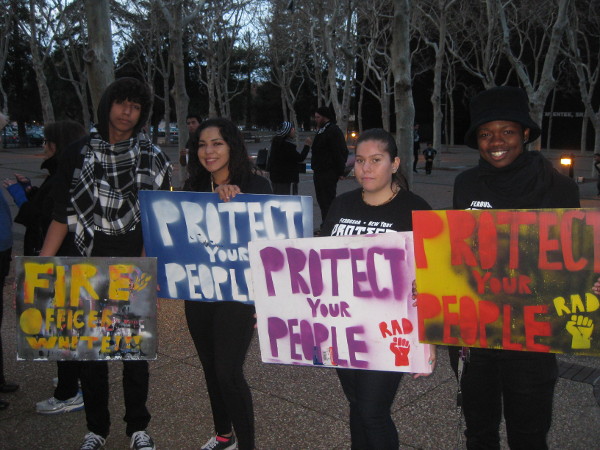
PHOTO/SANDY PERRY
SAN JOSE, CA — On December 18, the residents of San Jose, California held a diverse, spirited, and unified demonstration against the national epidemic of unpunished police murders. Its immediate cause was death threats to protestors tweeted by San Jose police officer Phillip White on social media. “Threaten me or my family,” wrote White, “and I will use my God-given and law-appointed right and duty to kill you. By the way, if anyone feels they can’t breathe or their lives matter, I will be at the movies tonight, off duty, carrying my gun.”
The rally was led by families of victims of local police violence, including Laurie Valdez from Justice for Josiah, whose husband was gunned down by San Jose State University Police in February. The strength of the demonstration was its unity across color lines, built by years of efforts by families fighting for justice for their loved ones. Although the police have historically targeted mainly Latinos and African-Americans, the diversity of San Jose’s population means that whites, Vietnamese, and others have also been affected by the killings and abuse, and have also organized in response.
The diversity of this struggle points to a deeper reality that underlies the violence. The lives that do not matter to the police, or to the system, are those of the people who are being cast out of the high technology Silicon Valley economy. As automation replaces their jobs, the very workers who built the area’s infrastructure are now considered expendable. This was graphically demonstrated on December 4, when San Jose demolished the nation’s largest homeless encampment on Story Road. Police drove out Latinos, whites, African-Americans, and Vietnamese alike and scattered them to the streets of the city.
Although it would only cost one-tenth of one percent of Silicon Valley’s corporate wealth to end homelessness, the system places a higher value on the profits of its corporations than on the very lives of its people.
San Jose’s recent Mayoral election did little to change the situation. The vote was split between the mainly upper-income and white neighborhoods on the West Side, who voted for the pro-corporate candidate, Democrat Sam Liccardo. The mainly working class, Latino, and Asian East Side neighborhoods voted for Democrat Dave Cortese, the union-supported candidate. Liccardo won a narrow victory, largely because Cortese organized his campaign around an anti-crime message promoted by the Police Officers Association, and failed to emphasize the desperate survival issues faced by a larger and larger section of the electorate.
Real change will come when the scattered struggles of people dispossessed by the hi-tech economy begin to coalesce and develop independent political campaigns to fight for their interests. Real change will come when we secure the political power necessary to put an end to police oppression and reorganize the economy to meet basic human needs
Sandy Perry is a longtime housing advocate from San Jose, CA.
